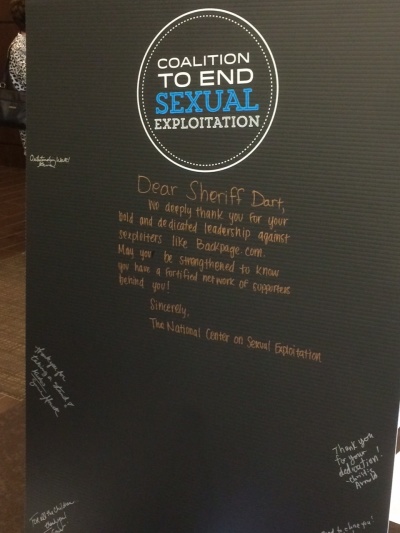Sexual Exploitation Summit Takes on Predatory Porn Industry and Victims of Child Porn

ORLANDO, Fla. — Clay Olsen, co-founder and CEO of Fight the New Drug, told hundreds gathered for an anti-pornography conference that he's seeing hundreds of thousands of young people rising up to demand an end to sexual exploitation of women.
"We have seen a movement of young people rallying around ending exploitation of women," Olson said. "We are seeing hundreds of thousands of youth get behind this and we are just getting started."
Olsen noted that the millennial generation is generally less trusting than their predecessors, but at the same time they are the generation that trusts science the most.
"Finally, science has caught up with the truth that pornography is harmful," he said. "Without the youth we will not nearly have the impact that we would otherwise. If we don't do something, the cycle of normalizing pornography will get worse."
Also speaking Friday morning during the second annual Coalition to End Sexual Exploitation Summit was Cordelia Anderson, founder and director of Sensibilities Prevention Services. Anderson focused on the dangers pornography poses as a public health issue.
Anderson emphasized the importance of narrative storytelling to shift the dynamics of the debate about the evil of sexually explicit content.
"The right kind of stories can cause the right kind of change," she asserted.
Anderson noted it was essential to reclaim human sexuality from popular culture and demand the entertainment industry stop framing the objectifying women as a normal part of sex.
Anderson asserted that 9 percent of young people today have viewed pornography by the age of 8.
"Children have gone from Dr. Seuss to porn," she said.
Anderson believes it's essential to create positive images of love and intimacy to combat the continued victimization of children. "Exposing our kids without counter-narrative is sexual neglect," said Anderson. "The biggest sex organ is not between our legs but between our ears."
She called for greater accountability for companies and corporations that are profiting from exploitation. "It is easier to blame individuals for their choices rather than holding systems accountable," Anderson declared.
Donald L. Hilton, a neurosurgeon in San Antonio, delivered a lecture titled "Brain Drain: Neurological Considerations of Pornography Addiction."
Hilton has aggressively responded to the sexual entertainment industry in peer reviewed medical journals that attempt to downplay addictions, calling the relationship between them and many in science "a cozy relationship." Hilton compared the relationships similar to tobacco companies that at one time received positive research and propaganda from many in the medical field.
Ernie Allen, former president and CEO of the National Center for Missing and Exploited Children, said the "explosion of child exploitation is rampant."
"Of the children we have identified, three-fourths [of the victims] are pre-pubescent," Allen said, noting that research indicates 1 percent of the male population is "exclusively pedophile, which amount to 35 million people worldwide."
"We are talking about a massive amount of people who are sexually attracted to young people," he said. "We have discovered this is a far greater challenge for us to make sure we are protecting children.
"The Internet has made this a global community — they can trade images, technique, fantasy, and even real children.We have witnessed the migration of the problem from the streets to the Internet." Allen argued that the Internet has made the victimization of children safer and more profitable for the offender.
Allen pointed to the unintended consequences of the U.S. government's promotion of anonymous use of the Internet, originally designed to protect Arab Spring activists, but it has provided a safe-haven for child predators.
"We are catching the really dumb ones, not the serious offenders who are the greatest threat," said Allen.
He further warned parents about children's access to smart phones, as people are now carrying the Internet wherever they go. "The use of mobile technology will increase 11 fold by 2018."
Allen noted solutions to the epidemic are needed and "attacking this as a public health issue changes the dynamic. "Our laws have failed," he said, adding that laws regulating and restricting access passed in the 1990s were struck down by the courts over the issue of free speech.
"Today's images are not going to satisfy you tomorrow. The addiction premise is the business model of the porn industry."





























